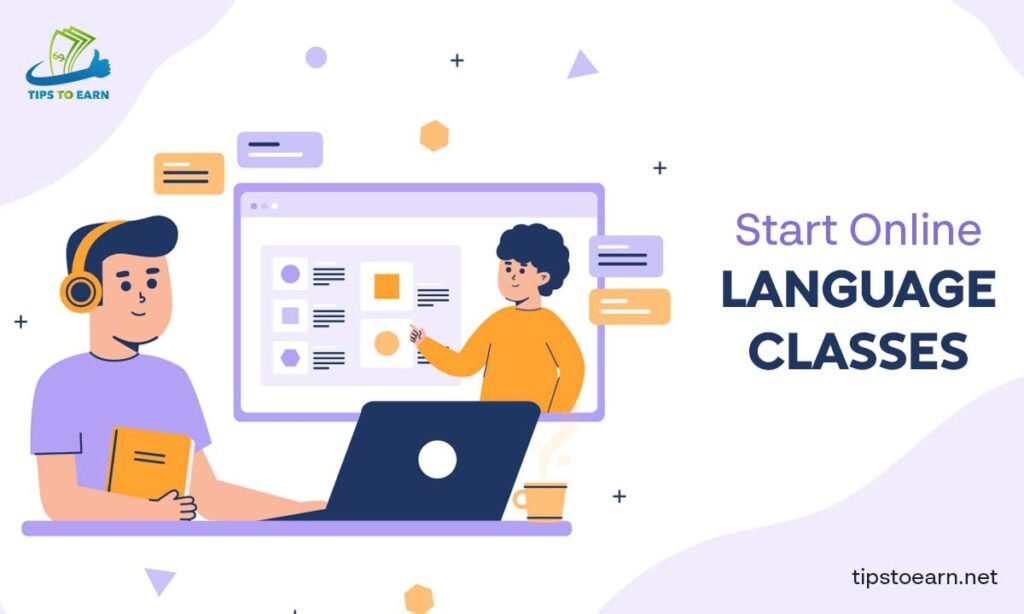Your success as an Online Language Classes tutor is determined by your capacity to hold students’ attention.
Online language class tutors who wish to charge high hourly rates, attract new students fast, and maintain their students’ interest should read this guide.
We created it in collaboration with some of the most accomplished and seasoned language tutors on the internet.
Top 21 Proven Tutoring Strategies To Start Online Language Classes

Learning from online language classes can lead to student motivation and engagement issues, such as feeling disconnected from their tutor and experiencing insecurity.
Mastering these skills is crucial for language tutors, who can earn thousands of dollars a month and find new students quickly.
Here are 21 strategies to improve student engagement and retention.
1. Adopt An Entrepreneurial Mindset And Approach Tutoring As A Company
Elite language tutors view teaching languages online as their business, treating students as customers and offering a delightful experience.
They value loyal and motivated students, spending extra time, customizing content, conducting extra research, sharing resources, and forgiving small mistakes.
This approach ensures a positive learning environment and encourages students to achieve their goals from online language classes.
2. Give Immersion Versus Structured Learning Priority
Foreign language acquisition research suggests that drilling grammar concepts may not be an effective method for mastering a language.
Communication-centric tutoring approaches include unstructured, which involves improvising and discussing topics as students discuss, and structured, which involves choosing a discussion topic in advance and discussing it during live sessions.
Unstructured methods are less work-intensive and encourage spontaneous speaking, but may become monotonous over time.
Structured methods, on the other hand, involve choosing a topic based on students’ interests and providing new content, making lessons engaging and stress-free.
While it may require more effort, it can help build a strong reputation, high ratings, and a lower hourly rate.
3. Create And Enhance The First Lessons To Increase Activation
Your mission is to help students solve problems and achieve their goals through online language classes.
Your first lesson should be designed to add value and make students feel successful.
Activation success is measured by tracking lesson bookings.
Treating first lessons as a product onboarding experience can increase student return.
Consider questions to show students you’ll help them achieve their goals in the first 10-20 minutes, and onboard them to your teaching method.
Ensure students leave the lesson with clarity about the learning experience and how you can help them reach their goals.
4. Create Connections: Online Language Classes
Maintaining an informal tutoring relationship involves learning about students’ lives and sharing personal experiences.
This approach increases student engagement, as they look forward to lessons, resembling a friendly conversation with a friend.
5. Go Easy On Yourself
Becoming a great language tutor requires skill and experience, accumulating teaching hours, and embracing experimentation.
The tutor-student relationship is two-way, and not everyone is compatible.
Over time, adjust profile details and intro videos to attract the best students.
Remember, teaching is not just about language, but empowering students for better social, economic, and educational opportunities.
6. Begin With Casual Conversation
Breaking the ice at the beginning of a lesson by asking different people or letting them take turns can help students prepare for the lesson.
In group settings, learn more about students and select interesting topics.
If students dislike this part, keep it brief or leave it out.
7. Control Expectations And Persistently Seek Out Input
Tutors from online language classes often struggle to retain students and increase bookings after trial sessions due to their failure to understand and satisfy student expectations.
Students bring implicit expectations, such as expectations for a strict curriculum or help with speaking fear.
Uncovering these expectations is key to turning trial sessions into repeat lessons.
As students progress into regular lessons, they may provide feedback without asking, but it’s important to listen and ask directly to learn what they like and how to improve lessons.
By accepting and using feedback, tutors can better adapt to individual students and increase their retention.
8. Establish Measurable And Significant Objectives
Private tutoring is often used by adult students for language learning, but their motivations vary.
Understanding the student’s goals, timelines, and effort level is crucial for creating a student-centric learning experience.
Regularly measuring progress is essential, either through self-testing or revisiting the goal with the student.
Both strategies work depending on the context and students.
To make it part of the process, discuss the student’s goals, why they are important when they want to achieve them, and what has hindered their progress.
9. Honor Accomplishments
Language learning is a multi-year process, and celebrating progress is crucial for student motivation.
Observe and celebrate any improvement, whether it’s vocabulary usage, grammar improvement, or effort put in between classes.
This helps maintain motivation and ensures progress is recognized and celebrated.
10. Establish A Secure Atmosphere In Online Language Classes
Students often seek language classes for conversation due to a lack of time and patience.
Gently assist them in searching for words, not interrupting unless necessary.
Allow them to tell stories and make mistakes, as they are essential for language learning.
Create a safe and confident environment for students to make mistakes.
11. Utilize Technology To Your Advantage
Using digital tools like Skype, Google Docs, Notion, OneNote, and Miro can enhance lessons and save time.
These tools allow for real-time editing, content sharing, and collaboration.
However, it’s crucial to choose the right tool based on the student’s personality, goals, and technical abilities.
Introduce tools at the right time, ensuring they are tailored to the situation and student.
12. Adjust Gently While You Are In Online Language Classes
Elite tutors create a safe environment for students to express their thoughts, even making grammatical mistakes, to boost confidence and progress.
Perfectionism can hinder language acquisition.
Instead of correcting mistakes immediately, wait until the end of the sentence and ask students to correct their mistakes.
Providing corrections should be more like a recommendation.
13. Make Sure Pupils Converse As Much As They Can
To improve language skills, aim for 20% speaking time and let students do most of the talking.
Encourage open communication and ask questions to guide the conversation.
For students who are not talkative, use open questions to encourage open responses.
14. Give Pupils A Sense Of Importance
Online language classes make students feel VIP and awesome, remember their past class experiences, congratulate them on birthdays, and use their names.
Take notes and review them individually before each class. Pay attention to their goals and needs, offering extra preparation time or flexibility for exams.
Active listening is a great strategy to make students feel important, engaging them in discussions and asking questions.
Avoid answering in YES and NOs, as this may make them feel unmatched.
15. Make Use Of Body Language And Facial Expressions Actively
Through online language classes you can Build good relationships with students in digital settings can be challenging due to internet connection quality, screen size, and eye contact issues.
To make video calls feel more personal, use active listening, nodding, hand gestures, and a smile to show active listening, encouraging students to see and hear your words.
16. Maintain A Shared Note-Taking Document
Some students find it helpful to have specific words or phrases written down or reviewed later.
Creating a shared Google Doc can help with attention and note-taking.
Finalizing discussion notes after class and reflecting on students’ progress can also be beneficial.
This approach helps in planning for the next class.
17. Provide An Assessment In Your Online Language Classes
Feedback goes beyond celebrating success and correcting mistakes.
It should be specific, and honest, and provide students with a clear understanding of their strengths and areas for improvement.
18. Make Interesting Online Courses
To keep students engaged, use varied exercises and topics, alternating between familiar and unfamiliar subjects.
Use recent media like articles, videos, movies, and audio files.
Consider other engaging activities like describing pictures, creating presentations, playing games on a whiteboard, or listening to a song, depending on the student’s goals and wishes.
19. Give Pupils Options
To boost student motivation, encourage them to co-create the learning process.
Encourage them to choose from different topics, and provide choices on how to approach or speak about them.
Respect their changes and be prepared to discuss something else if needed.
Staying updated with world news can provide plenty of opportunities for spontaneous discussion.
20. Urge Pupils To Contribute Their Own Thoughts
In online language classes, you have to encourage students to suggest media types or topics and encourage them to choose their materials.
Collecting both your material and suggestions from different students can create a useful resource collection that needs occasional updates for relevance and timeliness.
21. Demand Self-Evaluation
Regular self-assessment helps determine students’ focus, motivation, and feedback.
If they consistently make mistakes, consider introducing new topics instead of new ones.
A subjective sense of progress is crucial for student motivation, so adjust accordingly if they stop reporting progress.
Related Content: 21 Ways To Make Money Online
Bottom Line
In online language classes, you are not constrained by the rules or formal education requirements of academic establishments when you work as an independent teacher.
You are allowed to explore, verify, and test your theories.
Use the aforementioned tactics as a springboard to help you become an exceptional language tutor.
Educate driven pupils, establish your schedule, and earn money online from any location.
You May Like Also:




Pingback: Create An Etsy Store: Get More Sales In 21 Proven Ways
Pingback: Become A Digital Marketer: 21 Tools To Achieve Your Goals
Pingback: 21 Ways To Make Money Online In 2024 - Tips To Earn
Pingback: Start Your Own Podcast: 21 Amazing Things To Talk About
Pingback: Start Offering Online Courses: 21 High Paying Niches To Consider